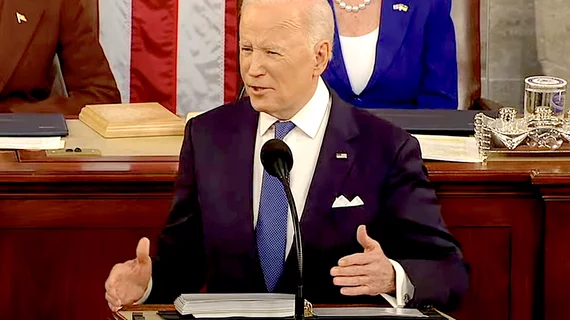Biden’s budget: Extend Medicare solvency through higher taxes on rich, more drug price changes
President Joe Biden is aiming to increase the duration of Medicare’s solvency for at least another generation with two major budget proposals that would increase taxes slightly for the richest Americans and enable the program to negotiate more drug prices.
In an op-ed with The New York Times, Biden explained his proposals as an extension of what he has already accomplished to reduce the deficit and lower healthcare spending.
“The budget I am releasing this week will make the Medicare trust fund solvent beyond 2050 without cutting a penny in benefits,” Biden wrote. “In fact, we can get better value, making sure Americans receive better care for the money they pay into Medicare.”
The budget would enable Medicare to negotiate with drug makers on the prices for more drugs. Until the Inflation Reduction Act (IRA), Medicare never had that ability, and instead the program had no bargaining power with drug manufacturers, which could charge steep prices to the federal program. The IRA enabled Medicare to negotiate the prices of some drugs, beginning over the next few years, and the Department of Health and Human Services (HHS) has already laid out that schedule. Biden wants to extend on this newly-gained power and allow Medicare to go after more drugs for negotiations to lower overall costs.
“My budget will build on drug price reforms by strengthening Medicare’s newly established negotiation power, allowing Medicare to negotiate prices for more drugs and bringing drugs into negotiation sooner after they launch. That’s another $200 billion in deficit reduction. We will then take those savings and put them directly into the Medicare trust fund.
Next, Biden wants to increase taxes on the richest Americans in order to boost the program’s solvency. The move is sure to be unpopular with Republicans in Congress, who want to repeal the Inflation Reduction Act, he said.
“My budget proposes to increase the Medicare tax rate on earned and unearned income above $400,000 to 5[%] from 3.8[%],” Biden wrote. “…This modest increase in Medicare contributions from those with the highest incomes will help keep the Medicare program strong for decades to come.”
The op-ed comes ahead of Biden’s budget proposal, which the White House plans to release later this week. While Congress controls the federal budget, the president always publishes his own proposed budget as an outline for what they would like to see approved by Congress.
“Add all that up, and my budget will extend the Medicare trust fund for more than another generation, an additional 25 years or more of solvency — beyond 2050,” Biden wrote. “These are common-sense changes that I’m confident an overwhelming majority of Americans support.”

